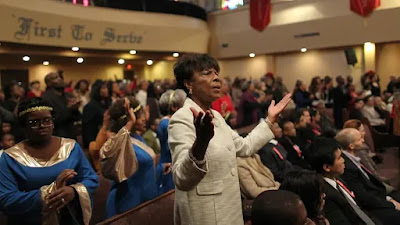The following information was actually written as an essay by Charyn D. Sutton, The Onyx Group, in December 2000 and revised in August 2004. The essay appears here in its entirety...
If you grew up in a black community in the United States, you have probably heard of "Watch Night" Services, the gathering of the faithful in church on New Year's Eve.
The service usually begins anywhere from 7:00pm-10:00pm and ends at 12:00 midnight with the entrance of the New Year. Some folks come to church first, before going out to celebrate. For others, church is the only New Year's Eve destination.
Like many others, I always assumed that Watch Night was a fairly standard Christian religious service, made a bit more Afrocentric because that's what happens when elements of Christianity become linked with the black church. And yes, there is a history of Watch Night Services in the Methodist tradition.
Still, it seemed that most white Christians did not include Watch Night Services on their calendars, but focused instead on Christmas Eve programs.
In fact, there were instances where clergy in mainline denominations wondered aloud about the propriety of linking religious services with a secular holiday like New Year's Eve.
However, in doing some research, I discovered there are two essential reasons for the importance of New Year's Eve services in African American congregations.
Many of the Watch Night Services in black communities that we celebrate today can be traced back to gatherings held on December 31, 1862, also known as "Freedom's Eve."
On that night, Americans of African descent came together in churches, gathering places, and private homes throughout the nation, anxiously awaiting news that the Emancipation Proclamation had become law. Then, at the stroke of midnight, it was January 1, 1863 and according to President Abraham Lincoln's promise, all slaves in the Confederate States were legally free. People remained in churches and other gathering places, eagerly awaiting word that Emancipation had been declared. When the actual news of freedom was received later that day, there were prayers, shouts of joy, and songs of praise as people fell to their knees and thanked God.
But even before 1862 and the possibility of a Presidential Emancipation, African people had gathered on New Year's Eve on plantations across the South. That is because many owners of enslaved Africans tallied up their business accounts on the first day of each new year. Human property was sold along with land, furnishings, and livestock to satisfy debts.
Families and friends were separated. Often they never saw each other again in this earthly world. Thus, coming together on December 31 might be the last time for enslaved and free Africans to be together with loved ones.
Black folks in North America have gathered annually on New Year's Eve since the earliest days, praising God for bringing us safely through another year and praying for the future. Certainly, those traditional gatherings were made even more poignant by the events of 1863 which brought freedom to the slaves and the Year of Jubilee.
Many generations have passed since that time and most of us were never taught the significance of gathering on New Year's Eve. Yet, our traditions and faith still bring us together at the end of every year to celebrate once again, "how we got over."
Please pass this information on to your family and friends so that they will know the true history behind the tradition we call "Watch Night".







































No comments:
Post a Comment